Libri, film e articoli consigliati per approfondire il tema della gestione delle emozioni.
Bibliografia consigliata
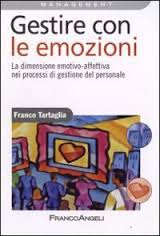 |
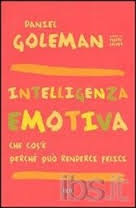 |
| Gestire con le emozioni. La dimensione emotivo affettiva nei processi di gestione del personale F. Tartaglia |
Intelligenza emotiva D.Goleman |
 |
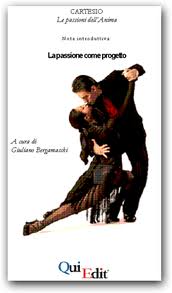 |
| Il risveglio del cuore in azienda. Poesia e preservazione dell’anima sul luogo di lavoro D. Whyte |
La passione come progetto . Le passioni dell’Anima (Cartesio) A cura di G. Bergamaschi |
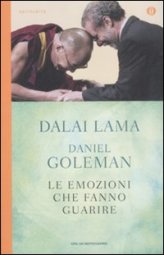 |
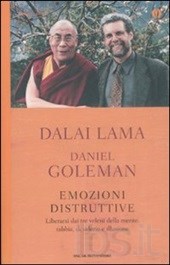 |
| Le emozioni che fanno guarire Dalai Lama |
Emozioni distruttive. Liberarsi dai tre veleni della mente: rabbia, desiderio e illusione Dalai Lama, D. Goleman |
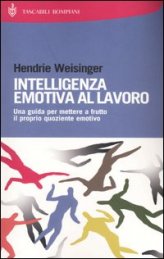 |
 |
| Intelligenza emotiva al lavoro. Una guida per mettere a frutto il proprio quoziente emotivo H. Weisinger |
Molecole di emozioni C. B. Pert |
 |
 |
| Quando hai fretta cammina lentamente. Ritrovare l’equilibrio in un mondo che corre E. Easwaran |
Vivere momento per momento J. K. Zinn |
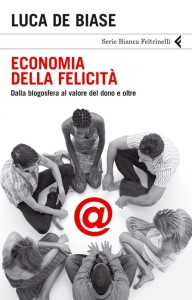 |
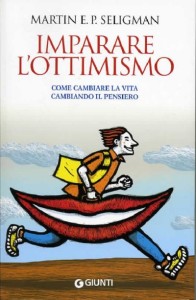 |
| Economia della felicità. Dalla blogosfera al valore del dono e oltre L. De Biase |
Imparare l’Ottimismo. Come cambiare la vita cambiando il pensiero M. Seligman |
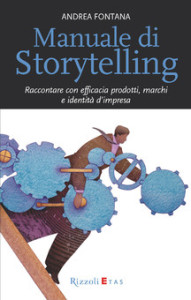 |
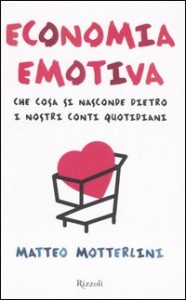 |
| Manuale di storytelling. Raccontare con efficacia prodotti, marchi e identità d’impresa A.Fontana |
Economia emotiva. Che cosa si nasconde dietro i nostri errori quotidiani M. Motterlini |
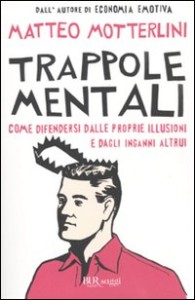 |
 |
| Trappole mentali Come difendersi dalle proprie illusioni e dagli inganni altrui M. Motterlini |
Piccola filosofia dei nostri errori quotidiani L. De Brabandere , A.Mikolajczak |
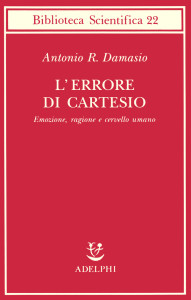 |
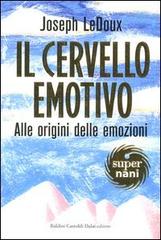 |
| L’errore di Cartesio Emozione, ragione e cervello umano A. Damasio |
Il cervello emotivo Alle origini delle emozioni J. Le Doux |
 |
 |
| La biologia delle credenze Come il pensiero influenza il DNA e ogni cellula B. Lipton |
Il miracolo dell’acqua M. Emoto |
Filmografia consigliata
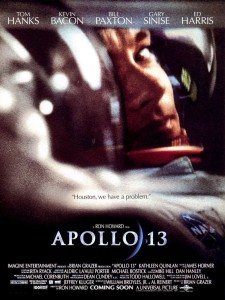 |
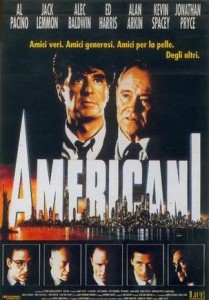 |
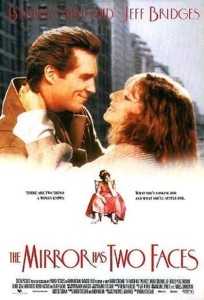 |
| Apollo 13 di Ron Howard |
Americani di James Foley |
L’amore ha due facce di Barbra Streisand |
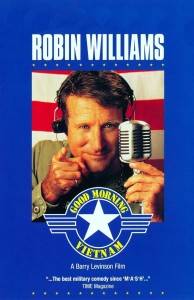 |
 |
 |
| Good morning Vietnam di Barry Levinson |
Sette anni in Tibet di Jean-Jacques Annaud |
Match Point di Woody Allen |
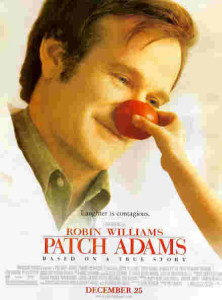 |
 |
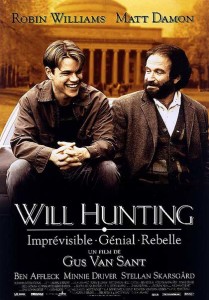 |
| Patch Adams di Tom Shadyac |
The Guardian di Andrew Davis |
Will Hunting di Gus Van Sant |
Articoli consigliati
Hatfield, E., Cacioppo, J. L. & Rapson, R. L. Emotional contagion. Current Directions in Psychological Sciences, 2, 96-99, 1993
E. Alison Holmana & Philip G. Zimbardo The Social Language of Time: The Time Perspective – Social Network Connection Basic and Applied Social Psychology Volume 31, Issue 2, 2009
Cohn MA, Fredrickson BL In search of durable positive psychology interventions: Predictors and consequences of long-term positive behavior change. J Posit Psychol. 1;5(5):355-366. Sep 2010
Raymond A. Mar / Keith Oatley / Jordan B. Peterson Exploring the link between reading fiction and empathy: ruling out individual differences and examing outcomes Communications. Volume 34, Issue 4, Pages 407-428, December 2009
Kahneman, D. (2003). Maps of Bounded Rationality: Psychology for Behavioral Economics. The American Economic Review, 93(5), 1449-1475.
Camerer, C. (1999). Behavioral Economics: Reunifying Psychology and Economics. PNAS, 96, 10575-1057.
Kenrick, D. T., Griskevicius, V., Sundie, J. M., Li, N. P., Li, Y. J., & Neuberg, S. L. (2009). Deep Rationality: The Evolutionary Economics of Decision Making. Social Cognition, 27(5), 764-765.
Sunstein, C. (2012, in press). The Storrs Lectures: Behavioral Economics and Paternalism. Yale Law Journal.
Ashraf, N., Camerer, C. F., & Loewenstein, G (2005). Adam Smith, Behavioral Economist. Journal of Economic Perspectives, 19 (3), 131–145.
Uchitelle, L. (2001, February 11). Following the Money, But also the Mind. The New York Times.
Erskine, J. A., Georgiou, G. J., & Kvavilashvili, L. (2010). I Suppress, therefore I Smoke: Effects of Thought Suppression on Smoking Behavior. Psychological science, 21(9), 1225-1230.
Wansink, B., Painter, J. E., & North, J. (2005). Bottomless Bowls: Why Visual Cues of Portion Size may Influence Intake. Obesity Research, 13(1), 93-100.
Myrseth, K. O.R., Fishbach, A., & Trope, Y. (2009). Counteractive Self-Control. Psychological Science, 20, 159-163.
Patrick, V., Chun, H. E., & MacInnis, D. (2009). Affective Forecasting and Selfcontrol: When Anticipating Pride Wins over Anticipating Shame in a Selfregulation Context. Journal of Consumer Psychology, 19(3).
Man’s Search for Meaning: The Case of Legos. Journal of Economic Behavior and Organization, 67, 671-677.
DeVoe, S. E. & Iyengar, S. S. (2010). Medium of Exchange Matters: What’s Fair for Goods is Unfair for Money. Psychological Science, 21(2), 159-162.
Haisley, E., & Loewenstein, G. (2011). It’s not what you get but when you get it: The effect of gift sequence on deposit balances and customer sentiment in a commercial bank. Journal of Marketing Research, 48(1), 103-115.
Magen, E., Dweck, C. S., & Gross, J. J. (2008). The Hidden-Zero Effect: Representing a Single Choice as an Extended Sequence Reduces Impulsive Choice. Psychological Science, 19(7), 648-649.
Mogilner, C. (2010). The Pursuit of Happiness: Time, Money, and Social Connection. Psychological Science, 21(9), 1348-1354.
Boyce, C. J., Brown, G. D., & Moore, S. C. (2010). Money and Happiness: Rank of Income, not Income, Affects Life Satisfaction. Psychological Science, 21(4), 471-475.
Quoidbach, J., Dunn, E. W., Petrides, K. V., & Mikolajczak, M. (2010). Money Giveth, Money Taketh Away: The Dual Effect of Wealth on Happiness. Psychological Science, 21(6), 759-763.
Maddux, W. W., Yang, H., Falk, C., Adam, H., Adair, W., Endo, Y., Carmon, Z., & Heine, S. J. (2010). For Whom is Parting with Possessions more Painful? Cultural Differences in the Endowment Effect. Psychological Science, 21(12), 1910-1917.
Iyengar, S.S., Wells, R.E., & Schwartz, B. (2006). Doing Better but Feeling Worse: Looking for the ‘‘Best’’ Job Undermines Satisfaction. Psychological Science, 17(2), 143–150.
Weber, B., Rangel, A., Wibral, M., Falk, A., & Akerlof, G. A. (2009). The Medial Prefrontal Cortex Exhibits Money Illusion. PNAS, 106(13), 5025-5028.
Frank, R. (2011, May 14). Why Worry? It’s Good for You. The New York Times.
Nocera, J. (2012, April 27). My Faith-based Retirement. The New York Times.
Surowiecki, J. (2012, June 4). The Fairness Trap. The New Yorker.
Norton, M. I., Mochon, D., & Ariely, D. The IKEA Effect: When Labor Leads to Love. Harvard Business School Marketing Unit Working Paper, (11-091).
Ariely, D., Gneezy, U., Loewenstein, G., & Mazar, N. (2009). Large Stakes and Big Mistakes. Review of Economic Studies, 76, 451-469.
Nordgren, L. F., & Chou, E. Y. (2011). The Push and Pull of Temptation: The Bidirectional Influence of Temptation on Self-control. Psychological Science, 22(11), 1386-1390.
Inbar, Y., Pizarro, D., Gilovich, T. & Ariely, D. (2013). Moral Masochism: On the Connection Between Guilt and Self-Punishment. Emotion, 13(1), 14-18.
Andrade, E. B., & Ariely, D. (2009). The Enduring Impact of Transient Emotions on Decision Making. Organizational Behavior and Human Decision Processes, 109(1), 1-8.
Gilbert, D. T., Morewedge, C. K., Risen, J. L., & Wilson, T. D. (2004). Looking Forward to Looking Backward: The Misprediction of Regret. Psychological Science, 15(5), 346-350.
Cryder, C. E., Lerner, J. S., Gross, J. J., & Dahl, R. E. (2008). Misery is not Miserly: Sad and Self-focused Individuals Spend More. Psychological Science, 19(6), 525-530.
McGraw, A. P., & Warren, C. (2010). Benign Violations: Making Immoral Behavior Funny. Psychological Science, 21(8), 1141-1149.
Mazar, N., & Zhong, C. B. (2010). Do Green Products Make us Better People? Psychological Science, 21(4), 494-498.
Gino, F., Norton, M. I., & Ariely, D. (2010). The Counterfeit Self: The Deceptive Costs of Faking It. Psychological Science, 21(5), 712-720.
Chance, Z., Norton, M. I., Gino, F., & Ariely, D. (2011) Mazar, N., Amir, O., & Ariely, D. (2008). The Dishonesty of Honest People: A Theory of Self-concept Maintenance. Journal of marketing research, 45(6), 633-644.
Gino, F., Ayal, S., & Ariely, D. (2009). Contagion and Differentiation in Unethical Behavior: The Effect of One Bad Apple on the Barrel. Psychological Science, 20(3), 393-398.
Yang, Y., Raine, A., Lencz, T., Bihrle, S., LaCasse, L., & Colletti, P. (2005). Prefrontal White Matter in Pathological Liars. British Journal of Psychiatry, 187, 320-325.
Zhong, C. & Liljenquist, K. (2006). Washing away your sins: Threatened morality and physical cleansing. Science, 313(5792), 1451-1452.
Von Hippel, W. & Trivers, R. (2011). The Evolution and Psychology of Selfdeception. Behavioral and Brain Sciences, 34(1), 1-56.
Shalvi, S., Dana, J., Handgraaf, M., & De Dreu, C. (2011). Justified Ethicality: Observing Desired Counterfactuals Modifies Ethical Perceptions and Behavior. Organizational Behavior and Human Decision Processes, 115(2), 181-190.
Gino, F. & Galinsky, A. (2010, May). When Psychological Closeness Creates Distance from one’s Moral Compass. In IACM 23rd Annual Conference Paper.
Vohs, K. D. & Schooler, J. W. (2008). The Value of Believing in Free Will: Encouraging a Belief in Determinism Increases Cheating. Psychological Science, 19(1), 49-54.
Tom Sawyer and the construction of value. Journal of Economic Behavior & Organization, 60(1), 1-10.
Tetlock, P. E., & Mellers, B. A. (2002). The great rationality debate. Psychological Science, 13(1), 94-99.
Johnson, E., & Goldstein, D. (2003). Do defaults save lives? Science, 302(5649), 1338-1339.
Jeffrey J. Froh,, Giacomo Bono An Understudied Virtue, Whittier College Gratitude in adolescence: an understudied virtue In press
Jeffrey J. Froh et al. Measuring Gratitude in Youth: Assessing the Psychometric Properties of Adult Gratitude Scales in Children and Adolescents American Psychological Association, Vol. 23, No. 2, 311-324, 2011
La base scientifica del sorriso, HBR Gennaio Febbraio 2012
E’ l’ansia a decidere quanto è grande lo spazio personale, Le Scienze, Settembre 2012
L’apparenza non inganna, Mente e Cervello Marzo Aprile 2005
Il bello di sbagliare, Mente e Cervello Agosto 2011
Effetto cravatta, Mente e Cervello Agosto 2011
Trucchi per la mente, Mente e Cervello Settembre 2011
La mente e il design, Mente e Cervello Gennaio 2012
La vita è un bluff, Mente e Cervello Febbraio 2012
In un batter di ciglia, Mente e Cervello Maggio 2012
L’arte della lusinga, Mente e Cervello Agosto 2012
Manipolare le memorie, Mente e Cervello Agosto 2012
La memoria secondo Marcel, Mente e Cervello Aprile 2013
Strani effetti, Mente e Cervello Aprile 2013
